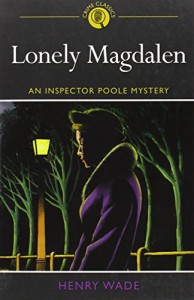Currently Reading






Find me elsewhere:
A Good Read -- Which Could Be So Much Better

Sigh. How to rate this book? There's a good story stuck in here, both as far as the mystery and the police investigation is concerned and as far as it comes to the back story. Inspector Poole is a likeable enough detective (much more so than his boss, who is decidedly more of the plodding persuation and who, in addition, couldn't give a fig for an accused's / suspect's rights); his investigation is inspired, and he manages to feel true emphathy for everybody involved in the case, from the victim to the witnesses and the suspects ... or so I thought until I reached the final chapters. Moreover, Wade, who had seen WWI battlefield action himself and thereafter entered public service, clearly knew what he was writing about in both areas. In fact, the middle part (which unravels the witness's back story as a sort of story within the story) was what I liked best, and it made me wonder why Wade (apparently) never tried his hand at literary fiction -- like all the leading lights of the Detection Club he was certainly a good enough writer to have been able to pull it off successfully.
But ... but. My enchantment wore off -- not entirely, but enough to take this book down a notch from the 4-star track on which it had been until then -- the further I got into the book's concluding third part. There had been one comment even in Part 2, concerning the supposed inheritability of a proclivity for a "profligate lifestyle" (which Wade, highly educated as he was, ought to have known better than to buy into, and which smacked uncomfortably of the notion of inherited "evil genes" or "criminal genes"), but I decided to let it go, thinking that maybe Wade had resorted to this notion in an attempt -- and probably not even such a misguided one, with a large part of his original audience -- to make the victim appear more sympathetic and her back story even more tragic ... as if the fall from baronet's daughter to prostitute wasn't dramatic enough in and of itself, especially in class-conscious 1930s England.
What began to grind on me after a while in Part 3, though, was that class consciousness also began to play a role in Inspector Poole's thought processes -- and it impacted his investigation, not to mention his acquiescence in his boss's misconduct.
When -- through Poole's own investigation -- suspicion falls on people from the victim's former life among England's nobility, we suddenly witness the inspector ruminating on what a shame it would be if people with that background would actually turn to murder to solve their personal difficulties, and we find him reminding himself with great effort that everybody is equal before the law and the suspects' personal background doesn't constitute grounds per se to exclude them from the investigation on the grounds of noblesse oblige (I didn't count how frequently exactly that expression cropped up in this context, but it certainly felt like a lot).
[Comments on the novel's resolution in both below spoilers; don't open them if you haven't read the book and are still planning to do so.]
(show spoiler)And when, in order to clinch the investigation shut, Poole's boss resorts to bullying the suspect who, at the time, has the strongest presumptions against him -- against all rules of proper police conduct and procedure, as both Poole and his senior officer realize perfectly well -- Poole stands by his boss when the issue is brought up before the judge, committing perjury rather than seeing the law that he himself is sworn to uphold actually be enforced, and the illegal interrogation thrown out.
(show spoiler)It can be argued of course (and Martin Edwards does in The Golden Age of Murder and The Story of Classic Crime in 100 Books) that Lonely Magdalen's conclusion is intended to expose police brutality. If so, the attempt is not exactly a rousing success in my book, however, and frankly, I don't actually buy it. Poole himself is too much caught up in the sort of corps spirit that makes his boss's misconduct possible in the first place -- he sweats a bit over his perjury, but he never seriously considers not to back up his boss; this sort of thing is just not done. And Poole is certainly leagues from Agatha Christie's Miss Marple, who would always put the discovery of the real culprit first, no matter who and how well-respected they are (because it just "wouldn't do" to let a murderer go free and see an innocent person hanged in their stead) -- not to mention the likes of Sherlock Holmes and Hercule Poirot (decidedly no respecters of class, either of them) and, by the same token, also the occasionally very class-conscious Lord Peter Wimsey, who likewise, as even his very first investigation makes clear, would rather see a highly respected member of society be convicted of a murder they've actually committed than let an innocent person without the means to afford a proper defense go to the gallows in his stead.
Since it was "only" the ending of the book that was marred in this way (and not everybody seems to be reading it in the same way as I do in the first place), I've decided to only take my rating down to 3 1/2 stars. Still, it's a pity, because there actually is much to both contemplate (in terms of the story) and to enjoy (in terms of the writing) here, and I'd very much hoped for this read to end on a different note.
I read this for both the "Long Arm of the Law" chapter / square of the Detection Club bingo and the Pancha Ganapti square of the 16 Tasks of the Festive Season.









 8
8  2
2 